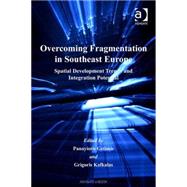
Note: Supplemental materials are not guaranteed with Rental or Used book purchases.
Purchase Benefits
What is included with this book?
| Preface | |
| Introductory Overview on the Main | |
| Themes of the Book: Overcoming the fragmentation of Southeast Europe: an introductory overview of main themes | |
| Integration vs | |
| Fragmentation in Southeast Europe | |
| Forces, Structures and Trends | |
| Integration and structural change: pre-accession experience in the regions of the European Union new member-states | |
| Disintegrated (or fragmented) public administration and regional development policy in Eastern Europe | |
| Delocalization of labour intensive activities in a globalized world: can things become better for the countries of Southeast Europe? | |
| Developmental planning and territorial integration prospects in South Eastern Europe: a foresight exercise in the region of Central Macedonia | |
| Spatial Development Perspectives | |
| Concepts, Facts and Visions | |
| Southeast Europe within changing European geographies - tracing socio-economic disparities and potentials of integration | |
| The new generation of European sustainable development documents and strategic development schemes of Serbia and Montenegro - the problem of correspondence | |
| Settlement patterns in Europe: elements and comparative typology | |
| Transport infrastructure priorities and territorial cohesion prospects in SE Europe | |
| Concluding on Integration Potential | |
| Territorial governance, institutional structures and trans-frontier cooperation prospects in South-Eastern Europe | |
| Index | |
| Table of Contents provided by Publisher. All Rights Reserved. |
The New copy of this book will include any supplemental materials advertised. Please check the title of the book to determine if it should include any access cards, study guides, lab manuals, CDs, etc.
The Used, Rental and eBook copies of this book are not guaranteed to include any supplemental materials. Typically, only the book itself is included. This is true even if the title states it includes any access cards, study guides, lab manuals, CDs, etc.